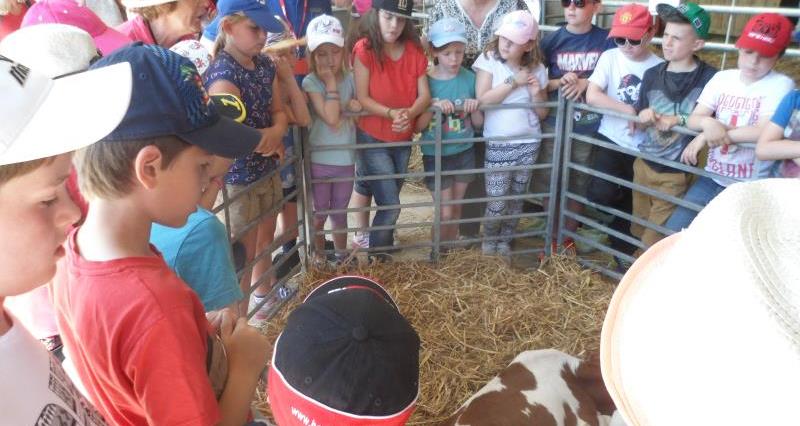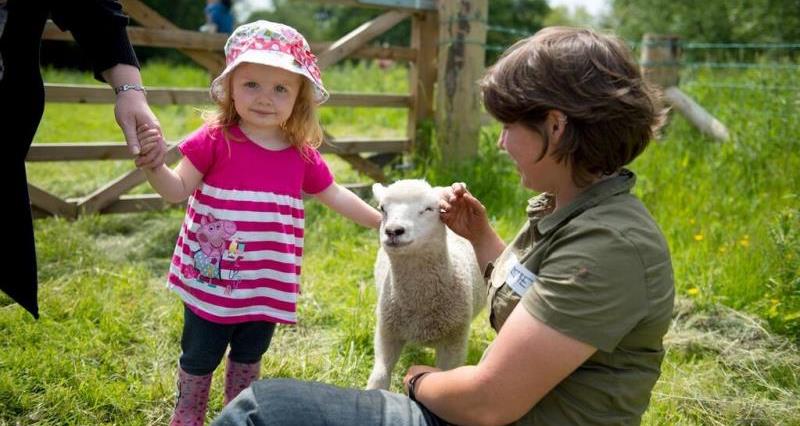He writes:
Spring lambing season and events like Open Farm Sunday will see many farms welcoming visitors, including school groups, on to their land. This is an invaluable way of educating the public about the countryside, and something the NFU welcomes, but it is also highlights the importance health and safety in the farmyard.
“Every year, many thousands of people visit farms and connect to where their food comes from and the countryside. As with any business activity it is vital that proper planning takes place and any risks are assessed and managed,” said NFU farm safety and transport adviser Thomas Price.
NFU members Steve and Jane Ellsmoor, of Dorrington Hall Farm, near Woore, Shropshire, have been welcoming visitors, for educational visits as part of their Countryside Stewardship agreement and now HLS for the past 16 years, and informally before then.
Hosting these pre-arranged visits also brings rewarding experiences in meeting people of all ages, from three year-olds to teaching students to pensioners, for the Ellsmoors on their 200-acre mixed farm, which has 170 ewes, 100 beef cattle, arable crops and a horse livery.
Top tips
Farmers hosting visits can find practical advice from the Visit My Farm website.
There's also a wealth of information on NFUonline, here.
Important things to consider include:
- Assess any risk
- Decide where you want people to go and plan a route and how you will keep visitors to it
- Decide which animals will be accessible and where they will be
- Keep eating and play areas away from animals
- Have adequate handwashing facilities with running water and soap to be used immediately after animal contact
Health and safety is an important consideration when hosting visits, including ensuring there are no problems with E.Coli infections. “We try to ensure we minimise risk on the farm as much possible. We realise that if we did have an incident, either a disease or an accident, it could seriously prejudice that part of the business,” said Steve, whose family has managed the farm since the 1920s.
The farm welcomes about 1,200 visitors annually, mostly schoolchildren but also other groups including Brownies and birdwatchers. Attractions available include tractor rides in a converted trailer equipped to accommodate wheelchairs; seeing livestock and farm vehicles; and wildlife walks and environmental art in woodlands. Lambing in March is the busiest time for visitors, including a community lambing day for local people.
The Ellsmoors are Farming and Countryside Education members, and praised the organisation for the support and advice it has offered to them over the years. They attended the Countryside Educational Visits Accreditation Scheme courses, which they found extremely useful.
Related...
- From NFUonline: Safety for visitors - get guidance here
- Our farm safety pages on NFUonline
- The Visit My Farm website
Steve said the farm’s visitor side has been developed between them, but it’s more the “baby” of Jane, a former trained primary teacher who spent most of her teaching career in further education. She holds a pre-visit meeting with each teacher bringing a school class to the farm for the first time. This enables Jane to understand the age, size and requirements of each group, and whether any children have additional needs. When the group comprises three or four-year-olds, the Ellsmoors usually only accept 12 or fewer children accompanied by a sufficient ratio of teachers, class assistants or volunteers. They host slightly larger groups of supervised older children.
Pre-visit meetings also cover the specific trip’s structure, clothing requirements and health and safety. Seven years ago, Natural England funding helped the Ellsmoors convert a farm building into having an upstairs classroom/meeting room with downstairs toilets, including one for disabled people and handwashing facilities. Handwashing with liquid soap and running water is the best way to make sure that any risk from infections such as E.Coli is minimised.
There is also a bootwashing area.
“I have a risk assessment for the farm and I hand that to the teachers at the pre-visit,” said Jane. “School visits always start with a welcome and telling the children about the farm, and then I do a thorough health and safety talk, including about handwashing and how to behave with animals.”
Adult visitors are given limitations on where they can go and receive health and safety advice, including that pregnant women shouldn’t visit during lambing due to potential infections that ewes could pass on.
The Ellsmoors enjoy hosting visitors and have developed close links with some schools that visit regularly. “It is part of the farming life here now,” said Steve, who added that the farm had received a lot of very good educational resources from the NFU.
Health and safety issues remain “paramount” when hosting visits, Jane added.
“It is vital because of the possible consequences, and it is professionalism as well.”
